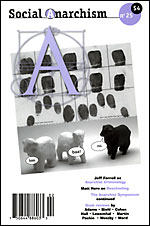An Anarchist "Rabbi"
An Anarchist "Rabbi": The Life and Teachings of Rudolf Rocker. Mina Graur. 272 pp. Jerusalem: The Magnes Press, New York: St. Martin's Press. 1997 cloth.
The East End Years: A Stepney Childhood. By Fermin Rocker. 192 pp London: Freedom Press. 1998. £7.95 paper.
Also covering: Fermin Rocker, The East End Years: A Stepney Childhood
Rudolf Rocker was a famous figure in the international anarchist world in the early decades of this century. But, Mina Graur observes, "even during the revival of anarchist ideas in the 1960s, Rocker's name did not emerge out of the oblivion into which it sank following the demise of the anarchist movement."
He was born in Germany in 1873 and died in New York state in 1958, and I can remember talking at a party in the East End of London in 1953 to celebrate his 80th birthday, and at a meeting in Toynbee Hall, Whitechapel in 1973 to commemorate his centenary among the good and the great of several different movements. One was that of the anarchist tradition, another was that of the labour unions of the East End, and yet another was that of the literature of the Yiddish language, represented on that occasion by the poet Avram Stencl.
Rocker was orphaned as a child and was reared in a Catholic orphanage in Mainz, running away to be a cabin-boy on a Rhine river steamer, but eventually apprenticed as a bookbinder. He joined, and was expelled from the German Social-Democratic Party, and, fleeing arrest, arrived in Paris in 1892. By 1898 he had moved to London and was asked to revive the journal Arbeiter Fraint, a task which involved learning the Yiddish language and its orthography.
I would have questioned Mina Graur's title but for the fact that in the 50s and the 70s, I certainly heard various old folk describe him as the secular equivalent of the rabbi. He became an absolutely unique figure because his work on the journals Arbeiter Fraint and Germinal was combined with weekend lectures at the Sugar Loaf pub, introducing his immigrant audience to the literature of Cervantes, Shakespeare, Goethe, Molière, and Tolstoy. But more than this, Rocker was revered as the organiser of workers in the baking and tailoring trades, including the famous tailors' strike of 1912 which sought to end the sweatshop system.
This world collapsed with the first World War. Rocker was interned as an enemy alien in various bizarre locations, as was eventually his companion Milly Witcop. They and the children were reunited in the ferment of Weimar Germany, where Rocker was an active organizer of the anarcho-syndicalist movement, faud, leaving the country hastily in 1933. In America the anarchist lobby made sure that a series of his books were published, like his various explanations of events in the Spanish Civil War, and his massive book Nationalism and Culture from 1937, and his study of Anarcho-syndicalism that came from a London publisher in 1938.
Mina Graur observes that,
World War II drew Rocker into a controversy similar to the one which involved Kropotkin in World War I. Whereas in 1914 Rocker disagreed with his teacher's support for France, to the point of accusing him of killing the spirit of internationalism, twenty-five years later he found himself repeating Kropotkin's arguments. Although Rocker did not view the Allies as carrying the banner of social revolution, as Kropotkin regarded France, he still believed, much like his mentor in 1914, that the world struggle was essentially a clash between two opposing forces.
Opponents set about demolishing his view that "[t]he Third Reich had to be defeated because life in England, France, or any other capitalist country was infinitely preferable to the German concentration camps." After that war I can remember one of my fellow editors of the London anarchist journal Freedom, John Olday, describing how Rudolf Rocker was living in luxury in New Jersey, while European workers were suffering. The sad truth is that mundane medical problems as well as difficulties with residence permits prevented Rocker from undertaking those lecture tours which could have brought an income and
security.
Like most anarchists, Rocker lived and died poor, but he was also a disappointed man, writing to Boris Yelensky in 1952 ,
It seems to me that our whole movement has become a hotbed for personal quarrels, not only here in America, but almost in every country. There is so much bitterness, self-glorification, and continual readiness to belittle or to abuse the good work of others, that we must not wonder that our movement has entered the most critical period of its existence since the time of the First International. The essential ideals of anarchism will never die and will always remain an inspiration for the future, but I doubt very much whether a revival of the libertarian spirit will come from the ranks of the present movement.
Mina Graur's book is a model of research and draws upon sources in German, Spanish, Hebrew, and of course, Yiddish. The last of these was vital, and is a reminder that there was a time when anarchist publishing in that language flourished in London, New York, and Buenos Aires. The famous New York journal Freie Arbeiter Stimme, founded in 1890, finally dwindled away as late as 1977.
By a nice coincidence, the publication of An Anarchist "Rabbi" coincides with that of Fermin Rocker's The East End Years. And the publication of that book coincided with an exhibition of his paintings in London to celebrate his 90th birthday. He provides a gentle picture of an affectionate anarchist household in an overcrowded apartment with a stream of visitors. His urban childhood idyll began to fall apart with the outbreak of the First World War in 1917, the internment of aliens, and the arrest of his father, followed by his older brother and finally his mother. Fermin grew up in Germany but in 1929, accompanying his father to the United States and intending to stay briefly, he settled and worked for years as an illustrator and commercial artist. Finally in 1972 he and his family moved to London, where his reputation as a painter has steadily grown in his old age.
Both of these excellent books provide glimpses of a vanished world.

